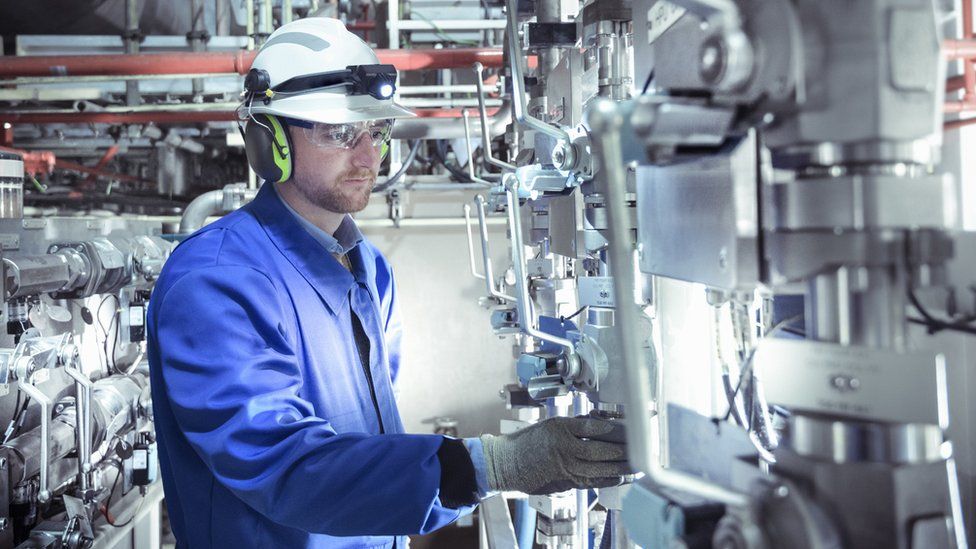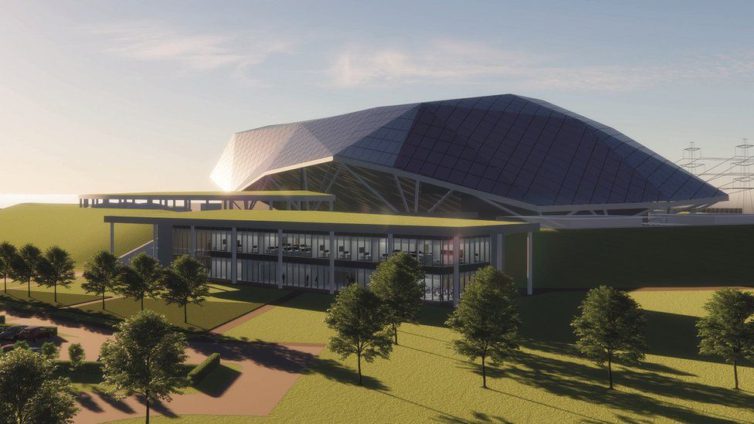Rolls-Royce has been backed by a consortium of private investors and the UK government to develop small nuclear reactors to generate cleaner energy.
The creation of the Rolls-Royce Small Modular Reactor (SMR) business was announced following a £195m cash injection from private firms and a £210m grant from the government.
It is hoped the new company could create up to 40,000 jobs by 2050.
However, critics say the focus should be on renewable power, not new nuclear.
Currently, about 16% of UK electricity generation comes from nuclear power.
Small modular reactors are nuclear fission reactors but are smaller than conventional ones.
The investment by Rolls-Royce Group, BNF Resources, Exelon Generation and the government will go towards developing Rolls-Royce's SMR design and take it through regulatory processes to assess whether it is suitable to be deployed in the UK.
It will also identify sites which will manufacture the reactors' parts and most of the venture's investment is expected to be focused in the north of the UK, where there is existing nuclear expertise.
'Cleaner energy'
Rolls-Royce SMR said one of its power stations would occupy about one tenth of the size of a conventional nuclear plant - the equivalent footprint of two football pitches - and power approximately one million homes.
The firm said a plant would have the capacity to generate 470MW of power, which it added would be the same produced by more than 150 onshore wind turbines.
Warren East, Rolls-Royce chief executive, said the company's SMR technology offered a "clean energy solution" which help tackle climate change.
Business and energy secretary Kwasi Kwarteng said SMRs offered opportunities to "cut costs and build more quickly, ensuring we can bring clean electricity to people's homes and cut our already-dwindling use of volatile fossil fuels even further".
"This is a once in a lifetime opportunity for the UK to deploy more low carbon energy than ever before and ensure greater energy independence", he added.

SMRs are thought to be less expensive to build than traditional nuclear power plants because of their smaller size. Due to the nature of Rolls-Royce's reactors, it is understood parts could be produced in factories and transported to sites by road, which would reduce construction time and costs.
At an expected cost of around £2bn each, SMRs would cost less than the £20bn each for the larger plant under construction at Hinkley Point and an anticipated, but not yet approved, sister plant at Sizewell in Suffolk.
If approved for use in the UK, it is understood Rolls-Royce SMR could build up to 16 reactors across the UK for electricity production.
Tom Samson, chief executive Rolls-Royce SMR, said the company had been established to "deliver a low cost, deployable, scalable and investable programme of new nuclear power plants".
"Our transformative approach to delivering nuclear power, based on predictable factory-built components, is unique and the nuclear technology is proven," he added.
However, Greenpeace's chief scientist Dr Doug Parr said SMRs were still more expensive than renewable technologies and added there was "still no solution to dispose of the radioactive waste they leave behind and no consensus on where they should be located".
"What's worse, there's not even a prototype in prospect anytime soon," he added. "The immediate deadline for action is sharp cuts in emissions by 2030, and small reactors will have no role in that."
Friends of the Earth's head of policy, Mike Childs, said government support should be "aimed at developing the UK's substantial renewable resources, such as offshore wind, tidal and solar, and boosting measures to help householders cut energy waste".
As part of a "10-point plan" to dramatically reduce greenhouse gas emissions to reach a target of net zero by 2050, the government has said nuclear power provides a "reliable source of low-carbon electricity" and that it is "pursuing large-scale nuclear", while also looking to invest in SMRs.
Tony Danker, director-general of the Confederation of British Industry, said the investment for Rolls-Royce was a "hugely promising milestone for a technology that can not only boost the economy but help deliver a greener and more secure energy system overall".
Meanwhile, Tom Greatrex, chief executive of the Nuclear Industry Association, added the funding sent a "huge signal to private investors that the government wants SMRs alongside new large-scale stations to hit net zero".
Latest Stories
-
Atiwa East DCE urges teamwork to drive development and attract investment
18 seconds -
Ɔdadeɛ Y2K group marks 25th anniversary with sustainable kitchen project at PRESEC
18 minutes -
New ECG board can ensure improvement – IPP Boss
29 minutes -
Our DCE is not involved in galamsey – Asaman Tamfoe Chief and residents defend Ernest Owusu Ntim
32 minutes -
Spare parts dealers instructed to slash prices to reflect cedi gains
60 minutes -
Ɔdadeɛ Y2K group highlights key projects to mark 25th anniversary
1 hour -
Cedi Appreciation: “Gold for oil” not the same as “Gold for reserves”
1 hour -
Reform Ghana school feeding programme – Eduwatch tells Gender Minister
1 hour -
Omane Boamah leads Ghana to join Burkina Faso in honoring Sankara and Rawlings at historic memorial ceremony
4 hours -
I was 20 when I played for Ghana’s U-17 team – Charles Taylor
6 hours -
JoySports Editor Fentuo Tahiru launches Tumu Community Cup set for May 24
6 hours -
Joseph Taylor breaks Ghana’s 29-Year 400m national record with sub-45s run
7 hours -
Greater Accra public lands: Government to set up Commission of Inquiry
7 hours -
Cleanliness to be used for measuring performance of MMDCEs – Mahama
7 hours -
You are now a beacon of hope – Nungua Mantse to President Mahama
7 hours

